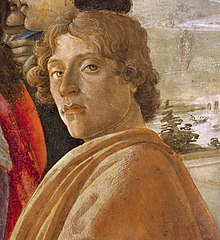Botticelli
| Sandro Botticelli | |
|---|---|

Probable self-portrait of Botticelli, in his Adoration of the Magi (1475)
|
|
| Born |
Alessandro di Mariano di Vanni Filipepi c. 1445 Florence, Republic of Florence, (now Italy) |
| Died | May 17, 1510 (aged c. 64) Florence, Republic of Florence |
| Nationality | Italian |
| Education |
Filippo Lippi Andrea del Verrocchio |
| Known for | Painting |
| Notable work |
Primavera The Birth of Venus The Adoration of the Magi Other works |
| Movement | Italian Renaissance |
Alessandro di Mariano di Vanni Filipepi, known as Sandro Botticelli (Italian: [ˈsandro bottiˈtʃɛlli]; c. 1445 – May 17, 1510), was an Italian painter of the Early Renaissance. He belonged to the Florentine School under the patronage of Lorenzo de' Medici, a movement that Giorgio Vasari would characterize less than a hundred years later in his Vita of Botticelli as a "golden age". Botticelli's posthumous reputation suffered until the late 19th century; since then, his work has been seen to represent the linear grace of Early Renaissance painting.
Among Botticelli's best-known works are The Birth of Venus and Primavera.
Botticelli was born in the city of Florence in a house in the Via Nuova, Borg'Ognissanti, to Mariano di Vanni d'Amedeo Filipepi. Vasari reported that Botticelli was initially trained as a goldsmith by his brother Antonio. There are very few details of Botticelli's life, but it is known that he became an apprentice when he was about fourteen years old, which would indicate that he received a fuller education than other Renaissance artists. By 1462 he was apprenticed to Fra Filippo Lippi; many of his early works have been attributed to the elder master, and attributions continue to be uncertain. Influenced also by the monumentality of Masaccio's painting, it was from Lippi that Botticelli learned a more intimate and detailed manner. As recently discovered, during this time, Botticelli could have traveled to Hungary, participating in the creation of a fresco in Esztergom, ordered in the workshop of Filippo Lippi by János Vitéz, then archbishop of Hungary.
...
Wikipedia
